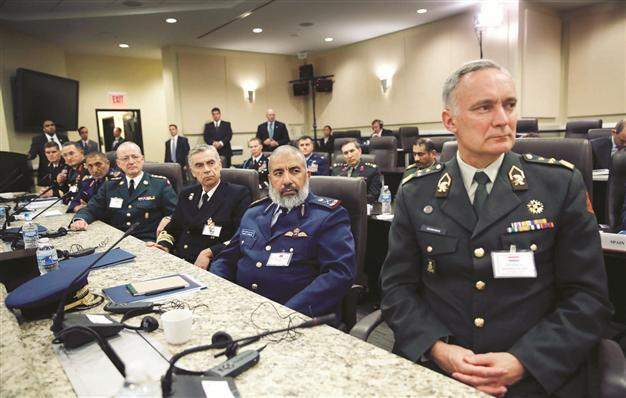US military team in Ankara for ISIL talks
Uğur Ergan ANKARA

Netherlands General Tom Middendorp (R-L), Chief of Staff of the Qatari Armed Forces Maj. Gen. Ghanim bin Shaheen Al-Ghanim, Admiral Fernando Garcia Sanchez, Chief of Defence of Spain and Lt. Gen. Ludvigsen, Vice Chief of Defence of Denmark listen as U.S. President Barack Obama speaks at a meeting with more than 20 foreign defense chiefs to discuss the ongoing campaign against ISIL, at Joint Base Andrews in Washington DC, Oct. 14. REUTERS Photo
Officials from both the United States European Command (EUCOM) and the U.S. Central Command (CENTCOM) commenced talks with Turkish high-ranking military officials Oct. 15 to fine-tune future moves against the Islamic State of Iraq and the Levant (ISIL).
The meetings, which are expected to continue on Oct. 16, came after the U.S. said Turkey had agreed on hosting, equipping and training the Syrian opposition.
The Turkish side strongly argued that the forces of the Democratic Union Party (PYD), which are doing the lion’s share of the fighting against ISIL in the Syrian border town of Kobane, should not be supported by any means.
Militants with links to the PYD have been fighting against ISIL in Kobane in Syria for more than three weeks, together with affiliated members of the outlawed Kurdistan Workers’ Party (PKK).
Turkey would rather support some putatively moderate groups based in the environs of Damascus and Aleppo, which include Turkmens, according to sources.
The talks included the use of the İncirlik base in Turkey and others by the U.S. and other forces in the coalition, sources added.
“Turkey has agreed to host and train and equip people,” U.S. Secretary of State John Kerry said Oct. 14.
“It certainly has allowed the use of certain facilities, and we don’t need to get into specifics except to say that I don’t believe there is any discrepancy with respect to what they will or won’t do,” Kerry told a press conference Oct. 14 after meeting Russian Foreign Minister Sergei Lavrov in Paris.
He said Turkey, a NATO ally that borders both Iraq and Syria, would define its role “on their timetable as we go forward in assigning and undertaking responsibilities within the coalition ... Turkey obviously has a very important role to play in this process going forward."
Kurdish fighters have been trying to push into the eastern part of the town, currently under ISIL control, said the Syrian Observatory for Human Rights, a British-based rights group that has a wide network of sources inside Syria.
Meanwhile, U.S. President Barack Obama told military leaders from more than 20 countries working with Washington to defeat ISIL on Oct. 14 that he was deeply concerned about the radical group’s advances in Kobane and western Iraq.
But Obama did not hint at any changes to what he saw as a long-term strategy that would see ups and downs in the months ahead, even as pressure builds for the coalition to stop ISIL from taking control of more territory.
“This is going to be a long-term campaign,” the president told the defense chiefs during a meeting at Andrews Air Force Base, outside Washington DC.
He spoke after U.S.-led air strikes pounded ISIL targets around Kobane.
“We’re deeply concerned about the situation in and around the Syrian town of Kobane, which underscores the threat that ISIL poses in both Iraq and Syria,” Obama said, adding that there is also currently a focus on the fighting in Iraq's Anbar province.
U.S. troops battled hard to secure Anbar against al-Qaeda militants in the war after the toppling of Saddam Hussein, but it is now at risk of being taken over again by ISIL militants.
“Coalition air strikes will continue in both of these areas,” Obama said.
The meeting of military chiefs from 22 countries also included representatives from Turkey and Saudi Arabia and was led by General Martin Dempsey, chairman of the U.S. Joint Chiefs of Staff.
Lt. Gen. Erdal Öztürk, the head of the Turkish Chief of Staff’s Operation Division, represented Turkey at the meeting. Necdet Özel, the chief of staff, reportedly did not participate due to his busy schedule and growing security threats immediately across from the Turkish border.
A U.S. military official told Reuters after the talks that there was an acknowledgement that ISIL was making some gains on the ground, despite the air strikes. But there was also a sense that the coalition, working together, would ultimately prevail, the official added.
“In the short term, there are some gains that they have been able to make. In the long term, that momentum will be reversed,” the official said, adding that the coalition would adjust its tactics as ISIL fighters increasingly blend into the population and become harder to target.
